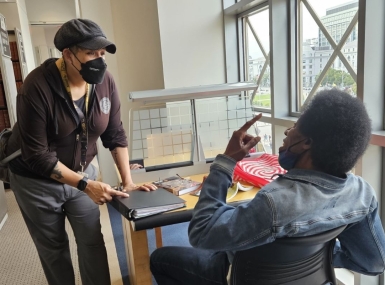USDA releases new state guidance on Pandemic Electronic Benefits Transfer plans for summer 2023
Upcoming Events
Related News

Key Takeaways
On February 16, the U.S. Department of Agriculture (USDA) Food and Nutrition Service (FNS) released new guidance regarding Pandemic Electronic Benefits Transfer (P-EBT) State Plans for the summer of 2023. USDA created the P-EBT program in response to the significant disruptions in employment and in-person school caused by the COVID-19 pandemic. Through P-EBT, eligible school children receive temporary emergency nutrition benefits loaded onto EBT cards that are used to purchase food. P-EBT and other increases to public assistance programs such as the Supplemental Nutrition Assistance Program (SNAP) contributed to decreasing food insecurity rates in 2021.
The Families First Coronavirus Response Act of 2020 (P.L. 116–127), as amended by the Consolidated Appropriations Act 2021 (P.L. 116-260), the American Rescue Plan Act of 2021 (P.L. 117-2) and the Consolidated Appropriations Act 2023 (P.L. 117-328) provided the Secretary of Agriculture authority to approve state agency plans to administer P-EBT.
The new USDA guidance includes a Q&A document and summer P-EBT plan template. These materials reflect the following changes to P-EBT contained in December’s FY 2023 omnibus appropriations package:
- Authorization for USDA to approve a state agency plan for the covered summer period alone, meaning that states can provide P-EBT benefits in the summer months regardless of whether they provide P-EBT benefits during the school year
- Prohibition of states to provide P-EBT benefits in summer 2023 to children who did not attend school at the end of the school year 2022-23 that participated in the National School Lunch Program or the School Breakfast Program
- Required that the P-EBT benefit for the entire 2023 covered summer period shall not exceed $120 per eligible child
The guidance coincides with the White House’s recent announcement of their intention to end the COVID-19 public health emergency (PHE) declaration on May 11, 2023, which will affect summer 2023 P-EBT benefits.
In the summer of 2023, the full P-EBT benefit is available to school children who received free or reduced-price meals under the National School Lunch Act. However, if the PHE ends in May, summer 2023 P-EBT benefits will not be available to children under six in SNAP-enrolled households. In addition, all funds must be distributed by the end of fiscal year 2023, which is Sept. 30, 2023, when the 2018 Farm Bill, which authorizes SNAP funding, is set to expire.
Counties have a significant role in the operation of the SNAP program. In 10 states, counties administer SNAP benefits, which account for 31 percent of all program participants. Counties operating SNAP often contribute significant levels of local funds to meet the administrative and supplemental costs of running the program.
While it is crucial that all eligible children have access to their P-EBT benefits in summer 2023, NACo appreciated that the FY 2023 Omnibus established a permanent nationwide Summer EBT program, starting in the summer of 2024 that will provide families whose children are eligible for free or reduced-price school meals with a $40 grocery benefit per child per month.
NACo has been strongly advocating for county SNAP priorities in the 2023 Farm Bill and will continue to monitor the end of the PHE and the impact this will have on P-EBT and other pandemic-era enhancements to safety net programs.
ADDITIONAL RESOURCES
Resource
Primer for Counties: 2024 Farm Bill Reauthorization

Related News
King County school offers students a route to sobriety
The Interagency Recovery Campus, funded in part by King County, Wash. Behavioral Health and Recovery, fosters an environment to support students' paths to sobriety.

Library program offers path to employment, stability
San Francisco County, Calif. Library Health and Safety Associates provide care and support to the unhoused patrons who congregate at the library — monitoring for overdoses and connecting them with county services such as showers, food or shelter.
